Publications
Books
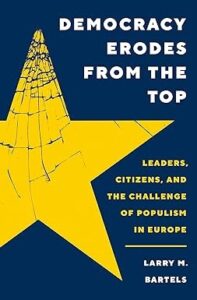 Democracy Erodes from the Top: Leaders, Citizens, and the Challenge of Populism in Europe (Princeton University Press, 2023, 2024). A seeming explosion of support for right-wing populist parties has triggered widespread fears that liberal democracy is facing its worst crisis since the 1930s. In this provocative book, Larry Bartels dismantles the pervasive myth of a populist wave in contemporary European public opinion, revealing that the real crisis stems not from an increasingly populist public but from political leaders who exploit or mismanage the chronic vulnerabilities of democracy. By demonstrating the inadequacy of conventional bottom-up interpretations of Europe’s political crisis, Democracy Erodes from the Top turns our understanding of democratic politics upside down. “Powerful.”—Andrew Moravcsik, Foreign Affairs. “Eye-opening.”—Jan-Werner Mueller, Project Syndicate. “Bartels brilliantly challenges the apocalyptic literature about the coming death of democracy.”—Nonna Mayer, Sciences Po. A Foreign Affairs best book of the year.
Democracy Erodes from the Top: Leaders, Citizens, and the Challenge of Populism in Europe (Princeton University Press, 2023, 2024). A seeming explosion of support for right-wing populist parties has triggered widespread fears that liberal democracy is facing its worst crisis since the 1930s. In this provocative book, Larry Bartels dismantles the pervasive myth of a populist wave in contemporary European public opinion, revealing that the real crisis stems not from an increasingly populist public but from political leaders who exploit or mismanage the chronic vulnerabilities of democracy. By demonstrating the inadequacy of conventional bottom-up interpretations of Europe’s political crisis, Democracy Erodes from the Top turns our understanding of democratic politics upside down. “Powerful.”—Andrew Moravcsik, Foreign Affairs. “Eye-opening.”—Jan-Werner Mueller, Project Syndicate. “Bartels brilliantly challenges the apocalyptic literature about the coming death of democracy.”—Nonna Mayer, Sciences Po. A Foreign Affairs best book of the year.
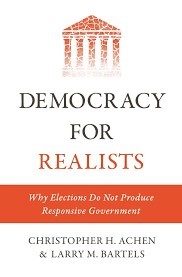 Democracy for Realists: Why Elections Do Not Produce Responsive Government (with Christopher H. Achen; Princeton University Press, 2016, 2017). Democracy for Realists assails the romantic folk-theory at the heart of contemporary thinking about democratic politics and government, and offers a provocative alternative view grounded in the actual human nature of democratic citizens. Achen and Bartels deploy a wealth of social-scientific evidence, including ingenious original analyses of topics ranging from abortion politics and budget deficits to the Great Depression and shark attacks, to show that the familiar ideal of thoughtful citizens steering the ship of state from the voting booth is fundamentally misguided. They argue that democratic theory needs to be founded on identity groups and political parties, not on the preferences of individual voters. Democracy for Realists provides a powerful challenge to conventional thinking, pointing the way toward a fundamentally different understanding of the realities and potential of democratic government. “Two of America’s smartest political scientists bid fair to transform our understanding of democracy.”—Robert D. Putnam, Harvard University. “Achen and Bartels have made a major contribution to modern social science.”—Donald R. Kinder, University of Michigan. Winner of the Association of American Publishers PROSE Award in Government & Politics.
Democracy for Realists: Why Elections Do Not Produce Responsive Government (with Christopher H. Achen; Princeton University Press, 2016, 2017). Democracy for Realists assails the romantic folk-theory at the heart of contemporary thinking about democratic politics and government, and offers a provocative alternative view grounded in the actual human nature of democratic citizens. Achen and Bartels deploy a wealth of social-scientific evidence, including ingenious original analyses of topics ranging from abortion politics and budget deficits to the Great Depression and shark attacks, to show that the familiar ideal of thoughtful citizens steering the ship of state from the voting booth is fundamentally misguided. They argue that democratic theory needs to be founded on identity groups and political parties, not on the preferences of individual voters. Democracy for Realists provides a powerful challenge to conventional thinking, pointing the way toward a fundamentally different understanding of the realities and potential of democratic government. “Two of America’s smartest political scientists bid fair to transform our understanding of democracy.”—Robert D. Putnam, Harvard University. “Achen and Bartels have made a major contribution to modern social science.”—Donald R. Kinder, University of Michigan. Winner of the Association of American Publishers PROSE Award in Government & Politics.
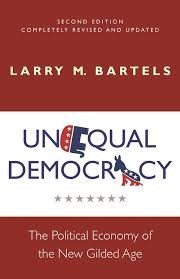 Unequal Democracy: The Political Economy of the New Gilded Age, 2nd edition (Russell Sage Foundation and Princeton University Press, 2016, 2018). The first edition of Unequal Democracy was an instant classic, shattering illusions about American democracy and spurring scholarly and popular interest in the political causes and consequences of escalating economic inequality. This revised and expanded edition includes two new chapters on the political economy of the Obama era, as well as new analyses of tax policy, partisan differences in economic performance, the struggle to raise the minimum wage, and inequalities in congressional representation. Bartels offers a sobering account of the barriers to change posed by partisan ideologies and the political power of the wealthy. President Obama identified inequality as “the defining challenge of our time.” Unequal Democracy is the definitive account of how and why our political system has failed to rise to that challenge. “Unequal Democracy is a major landmark in political scientists’ efforts to grapple with inequality.”—Benjamin I. Page, Perspectives on Politics. “No political scientist is more widely or rightly respected than Larry Bartels, and Unequal Democracy is a brilliant book that only he could have written.”—John J. DiIulio, Jr., University of Pennsylvania. Winner of the Gladys M. Kammerer Award for the year’s best political science publication in the field of U.S. national policy.
Unequal Democracy: The Political Economy of the New Gilded Age, 2nd edition (Russell Sage Foundation and Princeton University Press, 2016, 2018). The first edition of Unequal Democracy was an instant classic, shattering illusions about American democracy and spurring scholarly and popular interest in the political causes and consequences of escalating economic inequality. This revised and expanded edition includes two new chapters on the political economy of the Obama era, as well as new analyses of tax policy, partisan differences in economic performance, the struggle to raise the minimum wage, and inequalities in congressional representation. Bartels offers a sobering account of the barriers to change posed by partisan ideologies and the political power of the wealthy. President Obama identified inequality as “the defining challenge of our time.” Unequal Democracy is the definitive account of how and why our political system has failed to rise to that challenge. “Unequal Democracy is a major landmark in political scientists’ efforts to grapple with inequality.”—Benjamin I. Page, Perspectives on Politics. “No political scientist is more widely or rightly respected than Larry Bartels, and Unequal Democracy is a brilliant book that only he could have written.”—John J. DiIulio, Jr., University of Pennsylvania. Winner of the Gladys M. Kammerer Award for the year’s best political science publication in the field of U.S. national policy.
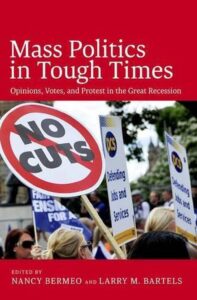 Mass Politics in Tough Times: Opinions, Votes and Protest in the Great Recession (edited with Nancy Bermeo; Oxford University Press, 2014). The Wall Street meltdown of 2008 triggered the greatest economic crisis of our lifetimes—but the political response to that economic disaster was, for the most part, remarkably muted and moderate. Nancy Bermeo and Larry Bartels assembled a distinguished team of scholars to explore this surprising turn of events. By placing political responses to the Great Recession in a broad comparative and historical context, they shed important light on prevailing theories of political behavior and on the nature of contemporary democratic politics. “Not only the definitive statement on popular reactions to the Great Recession of 2008-2009, but the best available treatment of political reactions to economic conditions and events more generally.”—Benjamin I. Page, Northwestern University. “A panoramic view of Crisis politics: the most important contribution to an empirical theory of democratic politics in decades.”—Paul Sniderman, Stanford
Mass Politics in Tough Times: Opinions, Votes and Protest in the Great Recession (edited with Nancy Bermeo; Oxford University Press, 2014). The Wall Street meltdown of 2008 triggered the greatest economic crisis of our lifetimes—but the political response to that economic disaster was, for the most part, remarkably muted and moderate. Nancy Bermeo and Larry Bartels assembled a distinguished team of scholars to explore this surprising turn of events. By placing political responses to the Great Recession in a broad comparative and historical context, they shed important light on prevailing theories of political behavior and on the nature of contemporary democratic politics. “Not only the definitive statement on popular reactions to the Great Recession of 2008-2009, but the best available treatment of political reactions to economic conditions and events more generally.”—Benjamin I. Page, Northwestern University. “A panoramic view of Crisis politics: the most important contribution to an empirical theory of democratic politics in decades.”—Paul Sniderman, Stanford
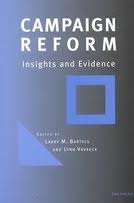 Campaign Reform: Insights and Evidence (edited with Lynn Vavreck; University of Michigan Press, 2000). This volume, the product of a major Task Force on Campaign Reform funded by the Pew Charitable Trusts, brings the expertise of leading political scientists to the public debate about campaign reform. The editors and contributors probe the reality behind the conventional wisdom that nasty, vacuous campaigns dominated by big money and cynical media coverage are perverting our political process and alienating our citizenry. Some of their conclusions will be starling to campaigners and critics alike. For students and scholars of electoral politics, political communication, and voting behavior, they provide an authoritative summary and interpretation of what we know about the nature and impact of political campaigns. “What is wrong with the current political climate? What would constitute successful campaign reform? These are deceptively simple questions, but the devil is in the details. … [The task force report] should be required reading for any course on campaigns and elections, and it is a useful blueprint for both reformers and scholars.”—Paul Gronke, American Political Science Review.
Campaign Reform: Insights and Evidence (edited with Lynn Vavreck; University of Michigan Press, 2000). This volume, the product of a major Task Force on Campaign Reform funded by the Pew Charitable Trusts, brings the expertise of leading political scientists to the public debate about campaign reform. The editors and contributors probe the reality behind the conventional wisdom that nasty, vacuous campaigns dominated by big money and cynical media coverage are perverting our political process and alienating our citizenry. Some of their conclusions will be starling to campaigners and critics alike. For students and scholars of electoral politics, political communication, and voting behavior, they provide an authoritative summary and interpretation of what we know about the nature and impact of political campaigns. “What is wrong with the current political climate? What would constitute successful campaign reform? These are deceptively simple questions, but the devil is in the details. … [The task force report] should be required reading for any course on campaigns and elections, and it is a useful blueprint for both reformers and scholars.”—Paul Gronke, American Political Science Review.
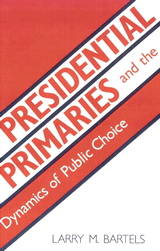 Presidential Primaries and the Dynamics of Public Choice (Princeton University Press, 1988). This innovative study blends sophisticated statistical analyses, campaign anecdotes, and penetrating political insight to produce a fascinating exploration of one of America’s most controversial political institutions—the process by which our major parties nominate candidates for the presidency. Bartels describes the complex interconnections among primary election results, expectations, and subsequent primary results that have made it possible for candidates like Jimmy Carter, George Bush, and Gary Hart to emerge from relative obscurity into prominence in recent nominating campaigns. “Presidential nominations have changed dramatically over the past two decades and have brought us quadrennial party reform committees, anguish and speculation by political analysts, and candidates as diverse as George McGovern and Ronald Reagan. At last, in Larry Bartels’ book they have brought us distinguished and imaginative scholarship.”—Gerald M. Pomper, Political Science Quarterly. Winner of the Woodrow Wilson Foundation Award for the year’s best book on government, politics, or international affairs.
Presidential Primaries and the Dynamics of Public Choice (Princeton University Press, 1988). This innovative study blends sophisticated statistical analyses, campaign anecdotes, and penetrating political insight to produce a fascinating exploration of one of America’s most controversial political institutions—the process by which our major parties nominate candidates for the presidency. Bartels describes the complex interconnections among primary election results, expectations, and subsequent primary results that have made it possible for candidates like Jimmy Carter, George Bush, and Gary Hart to emerge from relative obscurity into prominence in recent nominating campaigns. “Presidential nominations have changed dramatically over the past two decades and have brought us quadrennial party reform committees, anguish and speculation by political analysts, and candidates as diverse as George McGovern and Ronald Reagan. At last, in Larry Bartels’ book they have brought us distinguished and imaginative scholarship.”—Gerald M. Pomper, Political Science Quarterly. Winner of the Woodrow Wilson Foundation Award for the year’s best book on government, politics, or international affairs.
Articles
“House Republicans Were Rewarded for Supporting Donald Trump’s ‘Stop the Steal’ Efforts” (with Nicholas Carnes). Proceedings of the National Academy of Sciences (2023).
“Ethnic Antagonism Erodes Republicans’ Commitment to Democracy.” Proceedings of the National Academy of Sciences (2020).
“Partisanship in the Trump Era.” Journal of Politics (2018).
“Failure to Converge: Presidential Candidates, Core Partisans, and the Missing Middle in American Electoral Politics.” Annals of the American Academy of Political and Social Science (2016).
“Remembering to Forget: A Note on the Duration of Campaign Advertising Effects.” Political Communication (2014).
“A Generational Model of Political Learning” (with Simon Jackman). Electoral Studies (2014).
“Political Effects of the Great Recession.” Annals of the American Academy of Political and Social Science (2013).
“Democracy and the Policy Preferences of Wealthy Americans” (with Benjamin I. Page and Jason Seawright). Perspectives on Politics (2013).
“A Tale of Two Tax Cuts, a Wage Squeeze, and a Tax Credit.” National Tax Journal (2006).
“What’s the Matter with What’s the Matter with Kansas?” Quarterly Journal of Political Science (2006).
“Homer Gets a Tax Cut: Inequality and Public Policy in the American Mind.” Perspectives on Politics (2005).
“Beyond the Running Tally: Partisan Bias in Political Perceptions.” Political Behavior (2002).
“Question Order and Declining Faith in Elections.” Public Opinion Quarterly (2002).
“Presidential Vote Models: A Recount” (with John Zaller). PS: Political Science & Politics (2001).
“Partisanship and Voting Behavior, 1952-1996.” American Journal of Political Science (2000).
“Panel Effects in the American National Election Studies.” Political Analysis (2000).
“Electoral Continuity and Change, 1868-1996.” Electoral Studies (1998).
“Specification Uncertainty and Model Averaging.” American Journal of Political Science (1997).
“Pooling Disparate Observations.” American Journal of Political Science (1996).
“Uninformed Votes: Information Effects in Presidential Elections.” American Journal of Political Science (1996).
“The American Public’s Defense Spending Preferences in the Post-Cold War Era.” Public Opinion Quarterly (1994).
“Messages Received: The Political Impact of Media Exposure.” American Political Science Review (1993).
“Instrumental and ‘Quasi-Instrumental’ Variables.” American Journal of Political Science (1991).
“Constituency Opinion and Congressional Policy Making: The Reagan Defense Buildup.” American Political Science Review (1991).
“Candidate Choice and the Dynamics of the Presidential Nominating Process.” American Journal of Political Science (1987).
“Issue Voting Under Uncertainty: An Empirical Test.” American Journal of Political Science (1986).
“Alternative Misspecifications in Simultaneous-Equation Models.” Political Methodology (1985).
“Power and Influence as a Covariance Structure.” Political Methodology (1985).
“New Measures of Issue Salience: An Evaluation” (with Richard G. Niemi). Journal of Politics (1985).
“Expectations and Preferences in Presidential Nominating Campaigns.” American Political Science Review (1985).
“Resource Allocation in a Presidential Campaign.” Journal of Politics (1985).
“The Responsiveness of Approval Voting to Political Circumstances” (with Richard G. Niemi). PS: Political Science & Politics (1984).
Book Chapters
“Measuring Political Inequality.” In Noam Lupu and Jonas Pontusson, eds., Unequal Democracies: Public Policy, Responsiveness, and Redistribution in an Era of Rising Economic Inequality (Cambridge University Press, 2024).
“Democracy Erodes from the Top: Public Opinion and Democratic ‘Backsliding’ in Europe.” In Emmanouil M. L. Economou, Nicholas C. Kyriazis, and Athanasios Platias, eds., Democracy in Times of Crises: Challenges, Problems and Policy Proposals ( Springer Nature, 2022).
“Mass Politics in Tough Times” (with Nancy Bermeo). In Nancy Bermeo and Larry M. Bartels, eds., Mass Politics in Tough Times: Opinions, Votes and Protest in the Great Recession (Oxford University Press, 2014).
“Ideology and Retrospection in Electoral Responses to the Great Recession.” In Nancy Bermeo and Larry M. Bartels, eds., Mass Politics in Tough Times: Opinions, Votes and Protest in the Great Recession (Oxford University Press, 2014).
“Economic Inequality and Political Representation.” In Lawrence Jacobs and Desmond King, eds., The Unsustainable American State (Oxford University Press, 2009).
“Priming and Persuasion in Presidential Campaigns.” In Henry E. Brady and Richard Johnston, eds., Capturing Campaign Effects (University of Michigan Press, 2006).
“Three Virtues of Panel Data for the Analysis of Campaign Effects.” In Henry E. Brady and Richard Johnston, eds., Capturing Campaign Effects (University of Michigan Press, 2006).
“Inequality and American Governance” (with Hugh Heclo, Rodney E. Hero, and Lawrence R. Jacobs). In Lawrence R. Jacobs and Theda Skocpol, eds., Inequality and American Democracy: What We Know and What We Need to Learn (Russell Sage Foundation, 2005).
“Democracy with Attitudes.” In Michael B. MacKuen and George Rabinowitz, eds., Electoral Democracy (University of Michigan Press, 2003).
“The Impact of Candidate Traits in American Presidential Elections.” In Anthony King, ed., Leaders’ Personalities and the Outcomes of Democratic Elections (Oxford University Press, 2002).
“An Agenda for Voting Research.” In Elihu Katz and Yael Warshel, eds., Election Studies: What’s Their Use? (Westview Press, 2001).
“Campaign Quality: Standards for Evaluation, Benchmarks for Reform.” In Larry M. Bartels and Lynn Vavreck, eds., Campaign Reform: Insights and Evidence (University of Michigan Press, 2000).
“The Impact of Electioneering in the United States.” In David Butler and Austin Ranney, eds., Electioneering: A Comparative Study of Continuity and Change (Clarendon Press, 1992).
“After Iowa: Momentum in Presidential Primaries.” In Peverill Squire, ed., The Iowa Caucuses and the Presidential Nominating Process (Westview Press, 1989).
Essays and Reviews
“False Assumptions” (response to Jacob S. Hacker and Paul Pierson’s “The New Blue Divide”). Boston Review (2024).
“Democracy’s Challenges—And Ours” (forum on “Global Challenges to Democracy? Perspectives on Democratic Backsliding”). International Studies Review (2023).
“Trench Warfare: The 2020 Election in Historical Perspective.” Vanderbilt Project on Unity & American Democracy (2021).
“Government for the People: A Reply to the Symposium” (with Christopher H. Achen). Critical Review (2018).
“Statistics as if Politics Mattered: A Reply to Fowler and Hall” (with Christopher H. Achen). Journal of Politics (2018).
“Elections in America” (special editor’s introduction to symposium on “Elections in America”). Annals of the American Academy of Political and Social Science (2016).
Review of Inequality: What Can Be Done?, by Anthony Atkinson. Perspectives on Politics (2016).
“A First Step toward Happiness” (review of The Political Economy of Human Happiness, by Benjamin Radcliff). European Political Science (2016).
“Representation” (with Joshua D. Clinton and John G. Geer). In Richard Valelly, Suzanne Mettler, and Robert Lieberman, eds., The Oxford Handbook of American Political Development ( Oxford University Press, 2016).
“Democracy for Realists: Holding Up A Mirror to the Electorate” (with Christopher Achen). Juncture (2016).
“The Political Education of John Zaller.” Critical Review: A Journal of Politics and Society (2012).
“A New Deal Fantasy Meets Old Political Realities.” In Theda Skocpol, Obama and America’s Political Future (Harvard University Press, 2012).
“The Muddled Majority” (response to Martin Gilens’ “Under the Influence”). Boston Review (2012).
“Elections in Hard Times.” Public Policy Research (2012).
“The Politics of Less” (review of The Age of Austerity: How Scarcity Will Remake American Politics, by Thomas Byrne Edsall). Democracy (2012).
“Stanley Kelley, Jr.” (with John G. Geer and Fred I. Greenstein). PS: Political Science & Politics (2010).
“The Study of Electoral Behavior.” In Jan E. Leighley, ed., The Oxford Handbook of American Elections and Political Behavior ( Oxford University Press, 2010).
“Henry Brady, Big Scientist” (with Richard Johnston, Cynthia S. Kaplan, and Marcia K. Meyers). PS: Political Science & Politics (2009).
“The Irrational Electorate.” Wilson Quarterly (2008).
“Homer Gets a Warm Hug: A Note on Ignorance and Extenuation.” Perspectives on Politics (2007).
“Is the Water Rising? Reflections on Inequality and American Democracy.” PS: Political Science & Politics (2006).
“What’s Wrong with Short-Term Thinking?” (response to Rick Perlstein’s “How Can the Democrats Win?”). Boston Review (2004).
“Lots of Opinion, Not Much Action: The Study of Mass Politics from Key to Kinder.” In Edward D. Mansfield and Richard Sisson, eds., The Evolution of Political Knowledge: Theory and Inquiry in American Politics (Ohio State University Press, 2004).
“Unenlightened Self-Interest: The Strange Appeal of Estate Tax Repeal.” The American Prospect (2004).
“Is ‘Popular Rule’ Possible? Polls, Political Psychology, and Democracy.” Brookings Review (2003).
“Economic Behavior in Political Context” (with Henry E. Brady). American Economic Review, Papers and Proceedings (2003).
“Public Opinion: Political Aspects.” In Neil J. Smelser and Paul B. Baltes, eds., International Encyclopedia of the Social & Behavioral Sciences (Pergamon, 2001).
Campaign Reform: Insights and Evidence. Report of the Task Force on Campaign Reform Funded by The Pew Charitable Trusts. Woodrow Wilson School of Public and International Affairs, Princeton University (1998).
“The American National Election Studies: A Progress Report” (with Virginia Sapiro). PS: Political Science & Politics (1998).
“Econometrics and Elections.” Journal of Economic Perspectives (1997).
“Donald Stokes and the Study of Electoral Politics.” PS: Political Science & Politics (1997).
Review of Going Negative: How Political Advertisements Shrink and Polarize the Electorate, by Stephen Ansolabehere and Shanto Iyengar. Public Opinion Quarterly (1996).
Review of Public Opinion in America: Moods, Cycles, and Swings, by James A. Stimson. Political Science Quarterly (1992).
Review of Bifurcated Politics: Evolution and Reform in the National Party Convention, by Byron E. Shafer. American Political Science Review (1989).
“Poll Review: The 1988 Presidential Primaries” (with C. Anthony Broh). Public Opinion Quarterly (1989).
“Don’t Ignore History.” Brookings Review (1989).
Selected Op-Eds
“The Predicament of Mitt Romney.” Deseret News (2022).
“Under Trump, Democrats and Republicans Have Never Been More Divided—On Nearly Everything.” Washington Post—The Monkey Cage (2020).
“A Lot of Candidates May Make It Seem Like Democracy Is Working, But It Isn’t.” New York Times (2019).
“White People Get More Conservative When They Move Up—Not Down—Economically” (with Katherine Cramer). Washington Post—The Monkey Cage (2018).
“How Paul Ryan Lost the Republican Party.” Washington Post—The Monkey Cage (2018).
“Here’s How Little Americans Have Learned about Donald Trump.” Washington Post—The Monkey Cage (2018).
“The GOP Tax Bill is Business As Usual in America’s Unequal Democracy.” Washington Post—The Monkey Cage (2017).
“The ‘Wave’ of Right-Wing Populist Sentiment Is a Myth.” Washington Post—The Monkey Cage (2017).
“2016 Was an Ordinary Election, Not a Realignment.” Washington Post—The Monkey Cage (2016).
“The Myth of American Exceptionalism.” New York Times—Campaign Stops (2016).
“Why Are White Men the Soccer Moms of 2016?” Vox.com (2016).
“The Rise of Presidential Extremists.” New York Times—Campaign Stops (2016).
“No, Sanders Supporters Are Not More Liberal than Clinton’s: Here’s What Really Drives Elections” (with Christopher H. Achen). Washington Post—The Monkey Cage (2016).
“Do Sanders Supporters Favor His Policies?” (with Christopher H. Achen). New York Times—Campaign Stops (2016).
“The Presidential Primaries are Out of Control—and the Party Conventions are Broken” (with Christopher H. Achen). Los Angeles Times (2016).
“Can ‘Conservative Principles’ Boost Working-Class Incomes?” Washington Post—The Monkey Cage (2015).
“Here’s How a Cartoon Smiley Face Punched a Big Hole in Democratic Theory.” Washington Post—The Monkey Cage (2014).
“Obama’s Uphill Struggle Against Economic Inequality.” Washington Post—The Monkey Cage (2014).
“U.S. Is a World Leader in Class Conflict Over Government Spending.” Washington Post—The Monkey Cage (2014).
“Can the Republican Party Thrive on White Identity?” Washington Post—The Monkey Cage (2014).
“Rich People Rule!” The Monkey Cage (2014).
“In America’s War on Poverty, the Free Market is AWOL.” Washington Post—The Monkey Cage (2014).
“Your Genes Influence Your Political Views. So What?” Washington Post—The Monkey Cage (2013).
“Americans Are More Conservative Than They Have Been in Decades.” Washington Post—The Monkey Cage (2013).
“Power to (Altruists Concerned With) the Poor?” The Monkey Cage (2013).
“Who Needs Math?” The Monkey Cage (2013).
“The 1% Aren’t Like the Rest of Us” (with Benjamin I. Page). Los Angeles Times (2013).
“Obama Toes the Line.” The Monkey Cage (2013).
“Want a Strong Economy? Vote Democrat.” Salon (2012).
“Dueling Tax Truths.” Model Politics (2012).
“The Fiscal Facts of Life: Do Americans Understand Where Budget Deficits Come From?” Model Politics (2012).
“Meet the Undecided” (with Lynn Vavreck). New York Times—Campaign Stops (2012).
“Are Elections Too Much Like Musical Chairs?” New York Times—Campaign Stops (2012).
“Our Own Facts.” Model Politics (2012).
“Politics is a Matter of Life and Death (Times 23,000).” The Monkey Cage (2012).
“Occupy’s Impact Beyond the Beltway.” Moyers & Company (2012).
“What’s Really at Stake in the Payroll Tax Fight—And Why It Isn’t Over.” Model Politics (2012).
“Below the Surface, Surprising Trust in Government” (with Marc Hetherington). The Monkey Cage (2011).
“The President’s Fate May Hinge on 2009.” The Monkey Cage (2011).
“On Taxes, an Energized Minority.” Model Politics (2010).
“How Smart is the American Voter?” Los Angeles Times (2008).
“Why the Economy Fares Much Better Under Democrats.” Christian Science Monitor (2008).
“Inequalities: Since World War II, Republicans and Democrats Have Presided Over Startlingly Different Economies.” New York Times Magazine (2008).
“Who’s Bitter Now?” New York Times (2008).
“Economic Amnesia Buoys Incumbents.” Los Angeles Times (2004).
“GOP Always Falls Down on the Jobs.” Los Angeles Times (2003).

©2026 Vanderbilt University ·
Site Development: University Web Communications